Sign-Up forThe Weekly Dose and get blunt takes on cannabis news in your inbox.
Written by Kyra Reed
Unpaid bills are becoming a nasty epidemic in cannabis.
Just ask your local cultivator. Or the chef behind those gourmet edibles you love. Or even your favorite budtender.
As a small business owner with over 15 years of experience, I’ve had a few clients default or be delinquent in payments. Sometimes it’s par for the course. But it wasn’t until I started taking on cannabis clients that the issue became devastating to my business.
And the most alarming thing is that I’m not alone.
Almost everyone I know in the industry -- whether they’re directly touching the plant, or working in some sort of ancillary capacity -- is dealing with unpaid invoices and mountains of excuses for their non-payment.
This is unacceptable and unsustainable, and I’m tired of staying quiet about it while I watch one honest, hard-working person after another get taken.It's time for some transparency and accountability.
It's time for some transparency and accountability
I took to social media to address the unpaid bill epidemic in cannabis and received over 500 comments (and counting) across both LinkedIn and Facebook.
The financial and psychological effects that people shared have been heartbreaking.
There are layoffs and people are draining their life savings. People’s personal and business credit histories are getting ruined. Freelancers are feeling ashamed to even ask for the money they’re owed, and some employees can’t even pay for medical attention when necessary.
And on a macro level, these debts are choking innovation and forcing companies to neglect vital improvements to the supply chain.
In a market where there’s little access to outside capital or credit for the small business owner, if we don’t extend the “credit” to our vendors and partners, we limit our potential for growth.
The Catch-22 is that extending that credit is leaving us out to dry.
Granted, we all opted to start businesses in a high-risk market, with little infrastructure, under an avalanche of regulation and taxation. That still doesn’t equate to accepting not getting paid.
It's up to us to not cannibalize each other by holding back the money
While non-payment of invoices is an issue in any industry, it has a unique trickle down impact in cannabis because our businesses are deeply intertwined along the supply chain.
If a retailer doesn't pay their distributor for example, the distributor can't pay the manufacturers. The manufacturers then withhold payment to the cultivators, and so on, and so on. Products can't get made, bills don’t get paid, and the cycle continues down to individual employees who take the hardest hit when they don’t get a paycheck.
So why aren’t cannabis companies paying their bills?
While there is no single reason why non-payment of invoices is happening, all signs point to this being the fallout from a complex, unregulated and formerly illicit industry being rapidly legalized and regulated in a piecemeal manner -- with little infrastructure and no Federal oversight.
When it comes to companies “normalizing” paying their bills late (or not at all) there are six recurring threads:
1. A lack of business acumen and professionalism
From poorly-worded contracts or even operating without one, to improper budgeting and forecasting, to mismanagement of A/R, a lack of understanding of basic business practices make it hard to collect and distribute money efficiently, or at all.
A CPA shared her story:
“In the case of the company I worked for, when I was hired, they had a very large past due accounts payable balance and the primary reason was they had no idea what they were doing and didn't know how to keep track of their bills
The problems are found in every aspect of the business -- not just sloppy accounting -- and this lack of standard operating procedures (SOPs) create consequences that affect the entire ecosystem around a single business.
As a manufacturer in Santa Cruz shared:
“it compromises our ability to pay our brands on time, and our ability to extend terms to dispensaries that are professional and doing their job right. Some of the people who run deliveries and shops are just really unprofessional
2. A dearth of industry expertise and knowledge
Regardless of how educated or experienced a professional may be in their area of expertise, the cannabis industry is an entirely different beast.
Many new entrepreneurs are simply unprepared for how much they need to learn -- and how much it might cost to bring on someone who is experienced -- in order to operate successfully.
As David Barlow, a cultivator notes, that also leads to inaccuracies in terms of cost estimates (and forecasts for payment terms):
"There is a lack of true industry knowledge/experience in a lot of accountants, financial consultants, and even commercial cultivation/production consultants.
Production facilities rely on these people for accurate expense and revenue projections.
Without actual industry experience these estimates can end up hundreds of thousands of dollars off or...more!
3. Banking, banking, banking
Probably the biggest obstacle to a cash flow positive industry is the lack of federal banking and access to small business loans. Until banks are willing to jump in, we’re dependent on investors and sales alone to build a business from scratch.
Additionally, this lack of regulation (and lack of access to credit) makes it harder for vendors and partners to know who they can safely do business with.
As Tracee Reddik of Durango Finance points out:
"[The current state of] banking regulations are preventing firms from accessing traditional knowledge and databases that allow companies to make informed decisions about a potential client’s credit worthiness and history.
4. Taxes, taxes and more taxes
Taxes are smothering the cannabis industry (and in California they just went up...again), decreasing the already slim margins that plant-touching businesses face.
This pushes more businesses and customers into the illicit market, ensuring that legitimate vendors don’t get paid. Taxes also decrease the already slim margins plant-touching businesses face.
In addition to high tax rates, retailers and manufacturers have very few to no deductions to take advantage of.
5. It’s more expensive to start a cannabis business than you might think
As legalization sweeps the country, entrepreneurs with no cannabis experience at all are falling into a “green rush” mentality.
Thinking they’ve been successful in business before -- and cannabis is a great opportunity to get rich quick -- they rush into an application without doing their research.
One consultant from Colorado noted:
We have multiple prospects contact us when a new state becomes legal for help in their applications. At least 20% of them have already begun investing in their application without any awareness of 280e.
Anyone who is currently working in the industry can tell you, very few people are actually getting rich.
6. Greed, corruption and straight up malicious intent
Let’s face it, cannabis is an attractive industry for those who are looking to make a quick buck at the expense of others.
Whether they're coming from the black market -- exploiting loopholes and a lack of oversight -- or they come full of promises in a sharp suit with a big check, they’re playing a game where they are the only winners.
“The small producers, even the medium sized ones, all pay their bills. The big corporate companies are the ones that are an enormous problem.
They have press releases talking about all the money that’s coming in and meanwhile they bicker about their invoicing.
They stall and stall, stall, stall, and finally when it’s ready to go to collections they negotiate to buy their bill and then they move onto another lab and do the same.”
There are real, human, costly consequences
Now that we have a grasp on some of the causes of this epidemic, let’s look at just a few of the true costs of unpaid invoices:
1. Vendors end up becoming lenders at...1.5%
This is perhaps the most unfair and suffocating aspect of being a small business owner.
When we extend credit we are essentially becoming a bank, with the lowest interest rates possible. If our partners were to borrow the money from a credit card, bank or private lender, they’d be charged anywhere from 10-25%. When one company doesn’t pay their invoice, they’re able to grow while the other slows.
As one labor specialist shared:
“I have a contractor who is floating nearly a million in payroll for a cultivator.”
2. Local communities get hit hard
Due to federal and regional constraints on cannabis businesses, the industry is hyper local. It’s actually a big beautiful bonus that we bring to local communities (Shout out to Amanda Reiman and FlowKana for leading the way on being good community citizens) but it can devastate one as well.
E. shared what happened to her community when a company left all the employees unpaid:
“I am an employee of a CBD company that didn't pay a lot of their bills and many employees have unpaid paychecks ranging from $400-$12,000 total!!
3. Insurance agents are left covering costs
Insurance agents and backers in most industries take on the risk of non-payment (and being forced to return any commission they make) for the contracts they sell.
In cannabis it's happening at such a high rate that it’s increasing premiums, making some operators reluctant to work with cannabis companies.
4. It halts innovation along the supply chain
Cannabis needs infrastructure, and without federal support to build it, the industry is relying on small businesses to create the ecosystem from the ground up.
But when bills go unpaid, it limits a company's ability to purchase new equipment, pay for research or hire for expansion. That in turn hurts the overall progress of the supply chain.
5. Professionals from other industries are leaving or avoiding cannabis altogether
Our industry is in need of talented, professional people who operate with integrity and are willing to be team players. We also need goods and services from traditional businesses. Not paying them is sending a signal to other professionals to stay away from cannabis.
One budtender quit her job because she wasn’t getting paid, and now she’s reluctant to apply for a job in cannabis again:
They would make appointments for vendors to come from hours up to 4 hours away to pick up a check and then the owner would be gone and no check left. We would be standing there unable to pay them.
It made me feel so bad because I knew people had their own bills to pay.They would fire people and try not to pay them out.
And a Portland-based CPA had this experience:
“Had a big client that owed me about 10k get SOLD for millions because they HAD tax returns and books. Never paid. Discouraging to say the least.
It's hard to entice other CPA's to want to work with an unprofessional industry....the federal illegal status isn't nearly as much of an issue as the unpaid bills.
6. Life-altering consequences
The highest cost of all comes when people's personal lives change dramatically because their customers or employers won't pay their bills
Take Michele's experience as a prime example:
"Legit I told one company that was 90 days late that because they & 5 other clients were late with their payments, I was literally going to be homeless next week. The CFO called bullshit & that was offensive I would say something like that.
(Sadly it was the truth, I couldn't afford to pay rent in LA because of these bad actors & had to move out of state, where I am still saving up for a deposit for an apartment & am still trying to collect checks, only 2 of 5 have paid, I'm owed still 75,000+)
So how do we move forward?
Since I’m not a legal or financial expert, I can’t make recommendations about how anyone should handle their finances. But I have sourced some suggestions from the community for how we can protect ourselves (and empower each other) from unpaid bills:
- Work more stringent Terms and Conditions into our contracts, including Personal Guarantees.
As noted above, there are multiple ways to enter into agreements with terms that protect the vendor and the business:
- Take a higher percentage of the invoice upfront - Switch to Cash on Demand
- Refuse to deliver products and services until the invoices have been paid
- Include a 1.5% interest rate on late payments in contracts
- Insist on a personal guarantee that makes the company owner responsible for the payment, even if the company goes under
- Add a Kill Fee that triggers if the client cancels the contract early
- Hire a Collection Agency (there are Cannabis specific collection agencies)
*Leverage the "Theft of Services" Law
There is actually a law that prevents this kind of non-payment. While it doesn’t pertain to non-payment on goods, it's useful for freelancers and ancillary service providers.
From Wikipedia:
Theft of services is the legal term for a crime which is committed when a person obtains valuable services — as opposed to goods — by deception, force, threat or other unlawful means, i.e., without lawfully compensating the provider for these services.
*Employees: Contact your city or state's Department of Labor
Employees have recourse as well under the law. Contact the labor board to file a complaint. It may take time but it’s a way to recover money owed.
C. K. shared her experience with the labor board:
File a complaint first. It's an incredibly slow process but you're entitled to the money and once it goes through they'll literally send a sheriff to collect incoming checks for the business and pass them over to you. If you need to speed it up try small claims court.
The good news is, in California there's a penalty payment incurred on employers, so whenever they eventually do pay it'll help cover the financial burden it created on our family. If an employer takes more than 72 hours to give you a final check you are entitled to 30 days pay, accumulated as the check is later and later.
It's a penalty meant to encourage employers to actually give final checks. There are laws in place that make it so an employer can't just, not pay you.
*Consider Trade Credit Insurance
*Adopt a Blockchain-based tracking solution
When all else fails -- there’s the cannabis industry blacklist.
People talk and companies that get a reputation for not paying their bills will soon find themselves with a dwindling pool of potential partners.
On the other hand, we need a Green List -- and perhaps the equivalent of a Better Business Bureau -- to celebrate partners and vendors that are doing a great job!
This article is community sourced - and is in no way a complete analysis of the issue but rather a commentary on a rot in our industry.
I hope it will spark an industry wide conversation that spotlights how extensive this problem is in cannabis.
We can’t ignore it or hope that it works itself out...while one business after another goes under and our progress is held back. Thank you to all who contributed your story, your suggestions for solutions and advice.
We are #bettertogether.
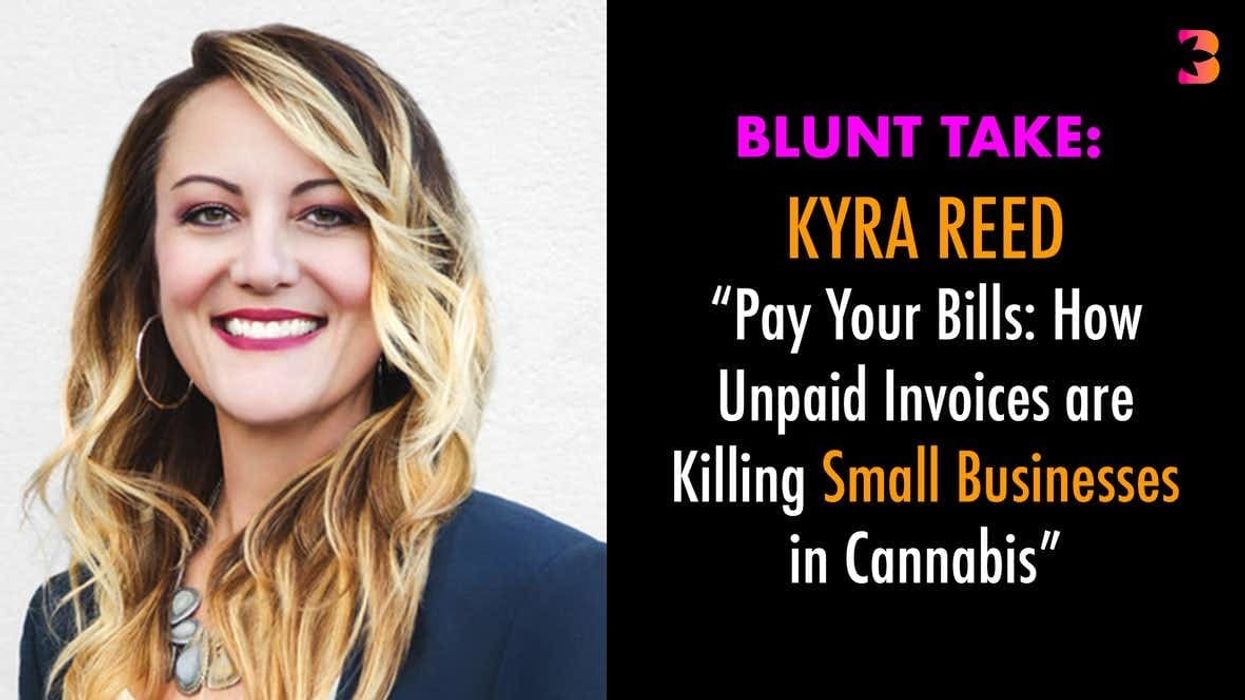

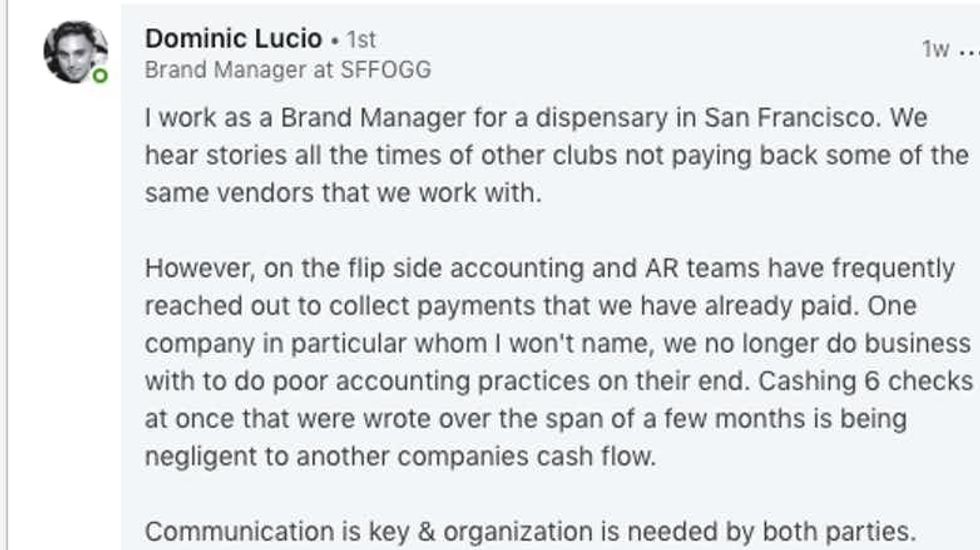
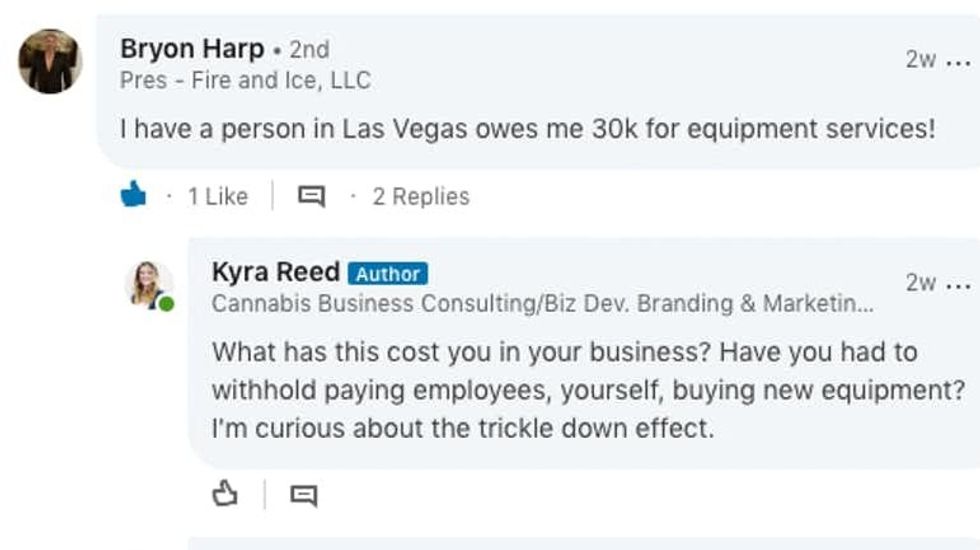



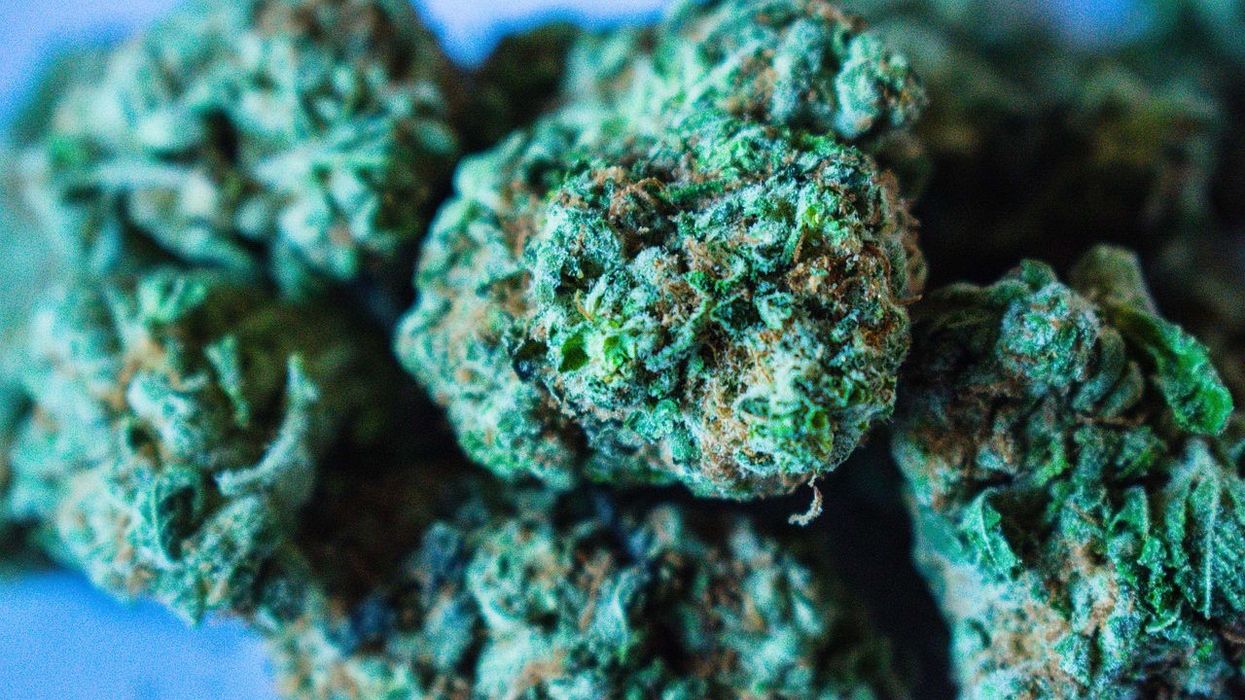
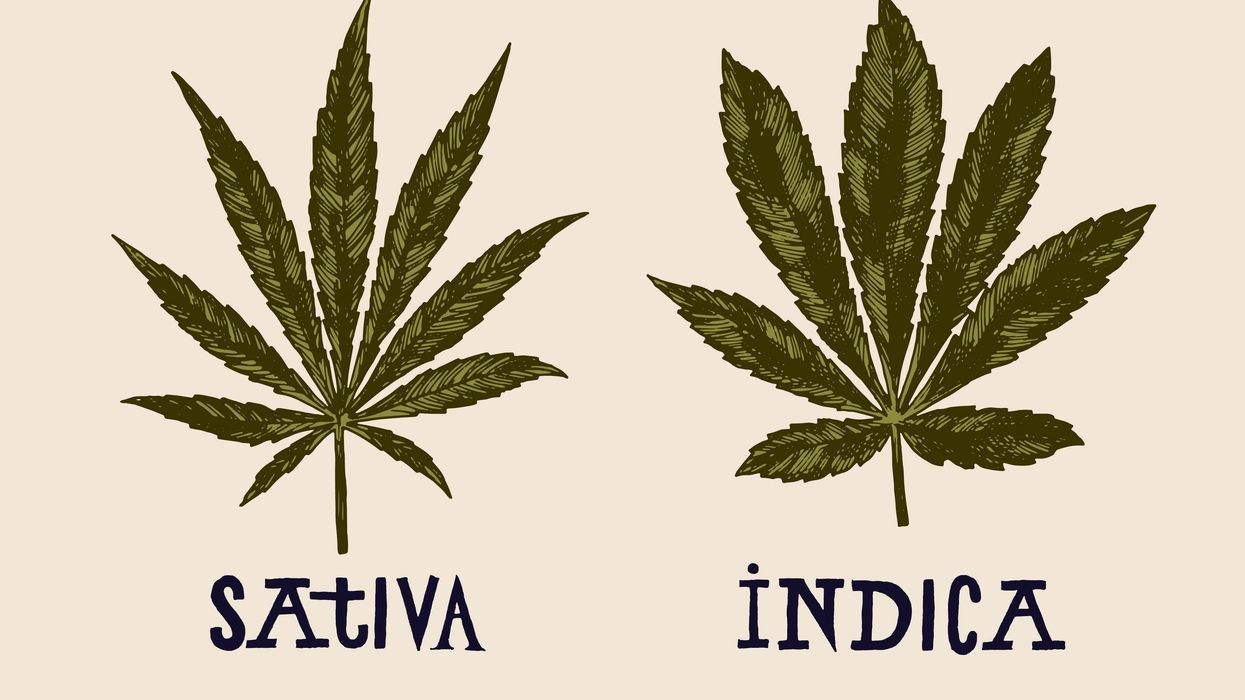
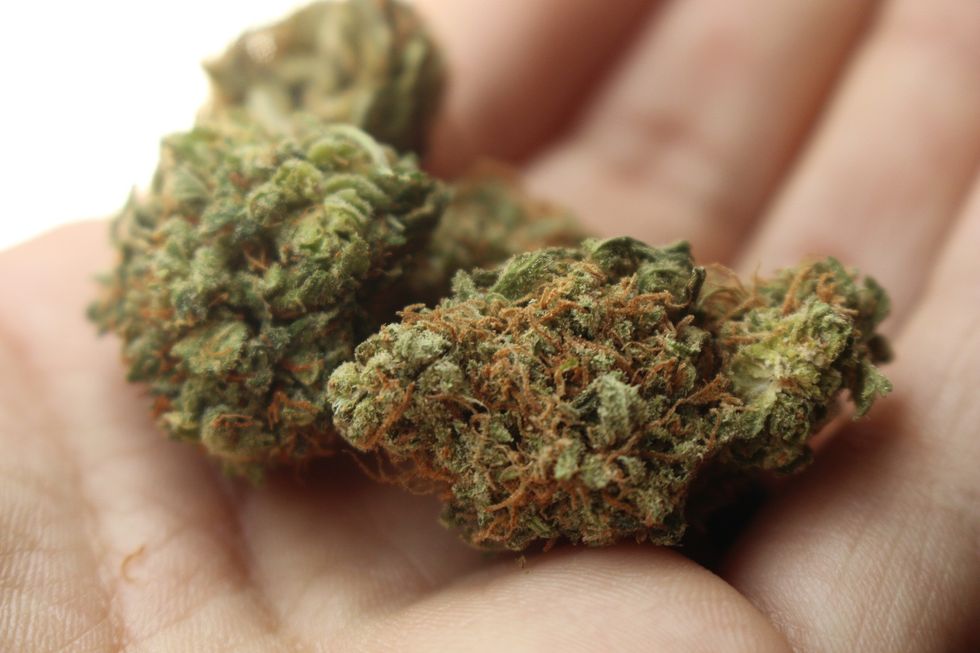 Indica vs. Sativa: Are These Cannabis Labels Outdated? - The Bluntness
null
Indica vs. Sativa: Are These Cannabis Labels Outdated? - The Bluntness
null
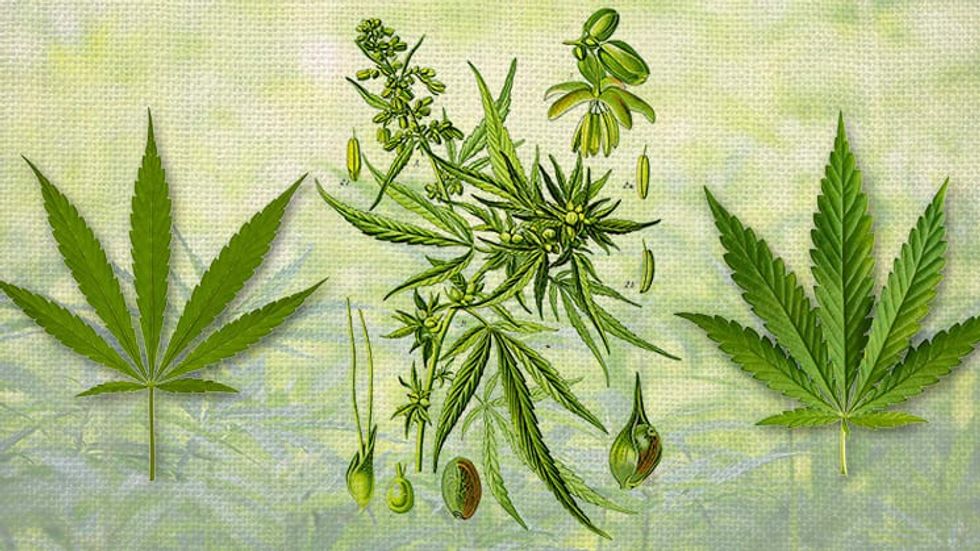 The Great Indica vs. Sativa Debate
Credit SenseiSeeds.com
The Great Indica vs. Sativa Debate
Credit SenseiSeeds.com
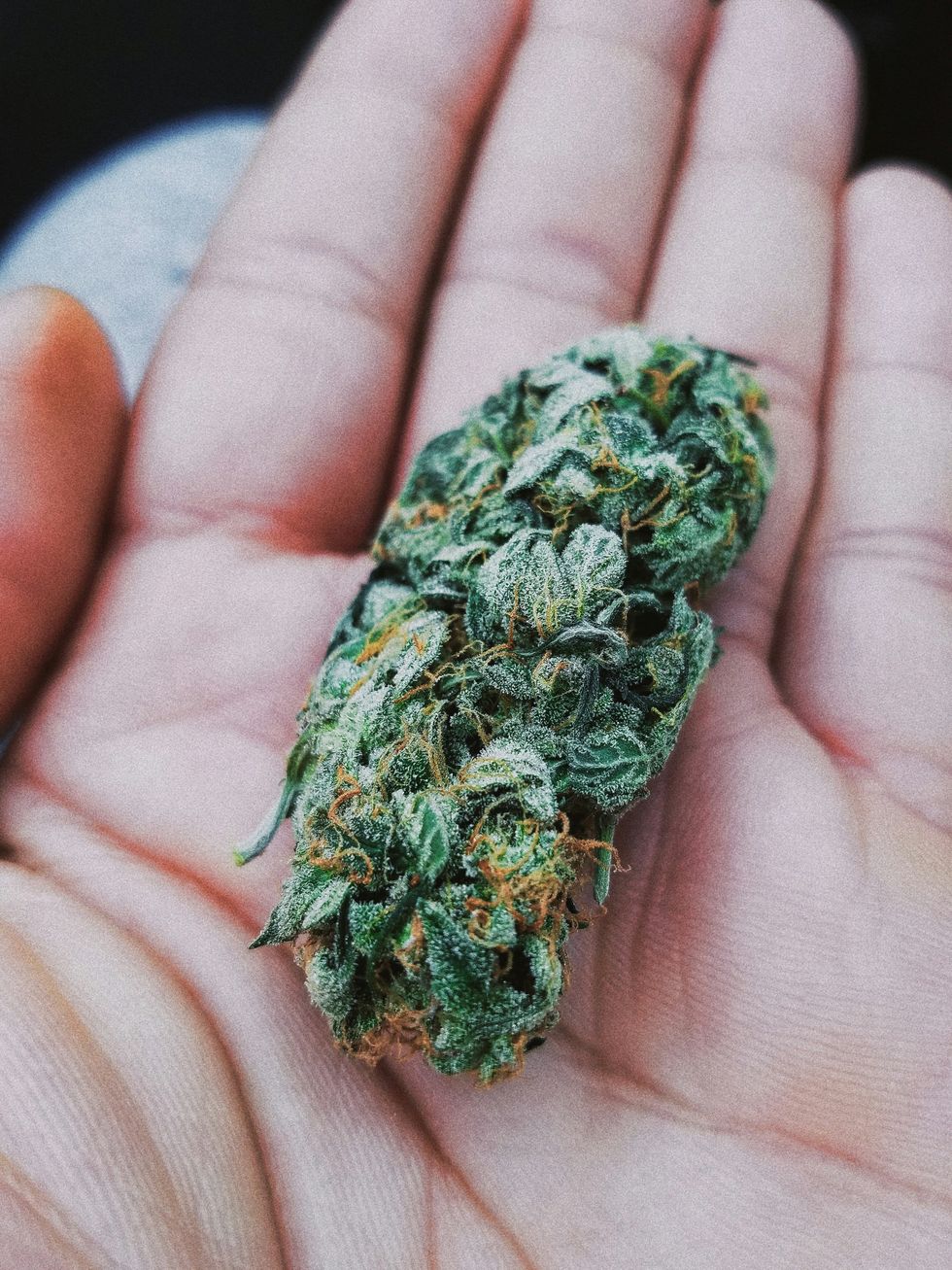 Why Cannabinoids Matter: Exploring The Third And Final Piece Of The Entourage Effect
Why Cannabinoids Matter: Exploring The Third And Final Piece Of The Entourage Effect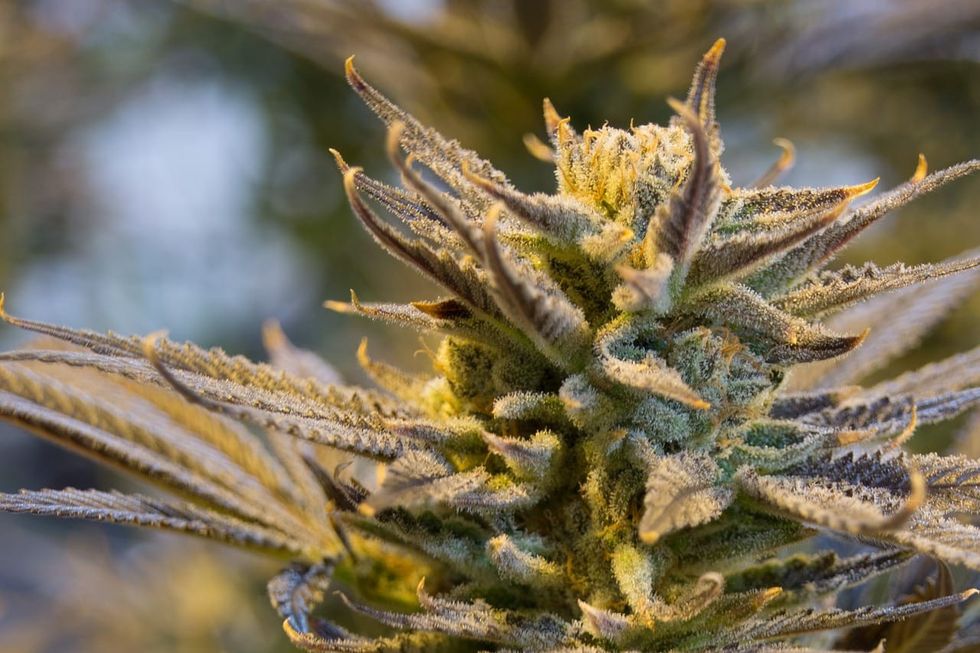 How do you think cannabis should be classified?
How do you think cannabis should be classified?



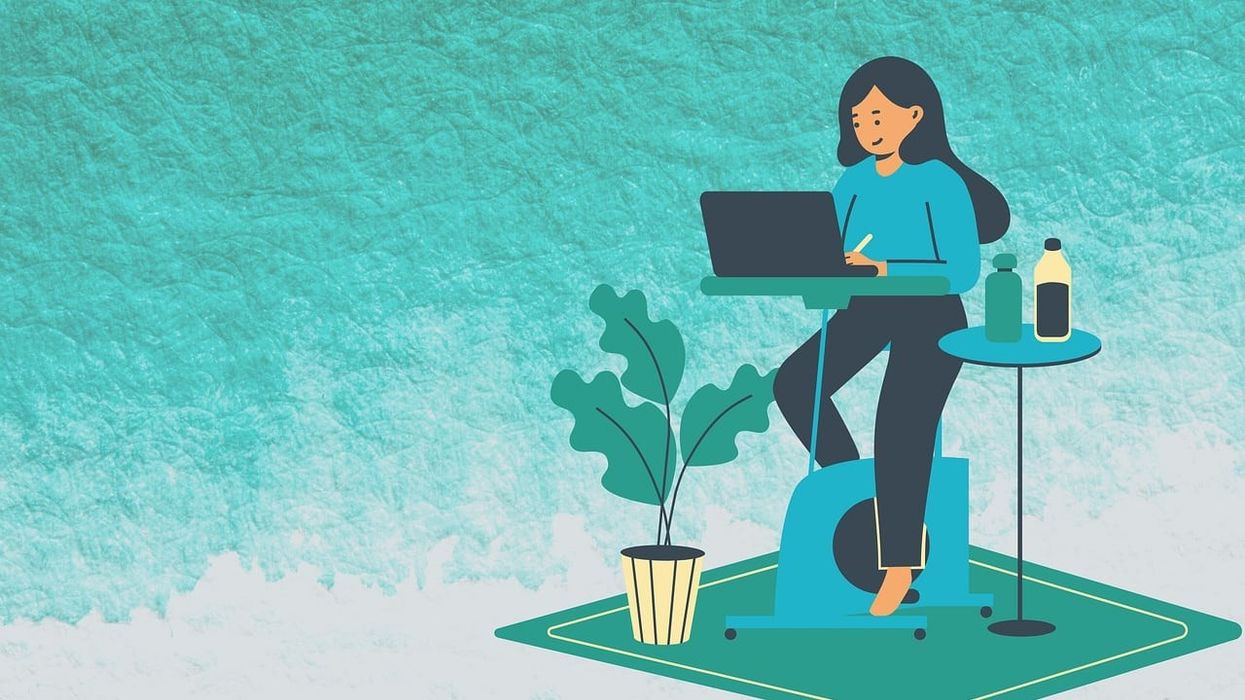


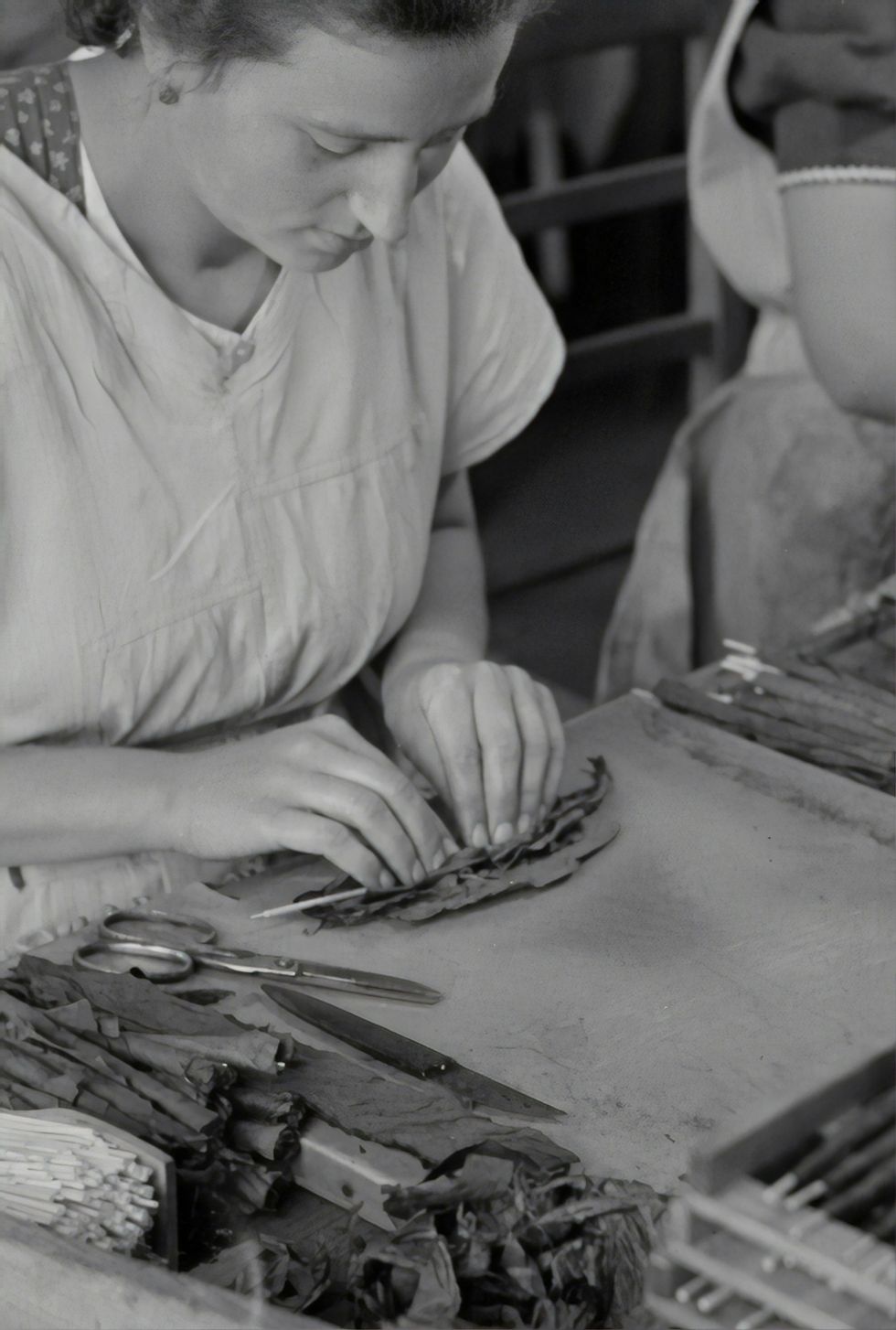 How to Make a Cannagar Without a Mold: A Comprehensive Guide - The Bluntness
Photo by
How to Make a Cannagar Without a Mold: A Comprehensive Guide - The Bluntness
Photo by 
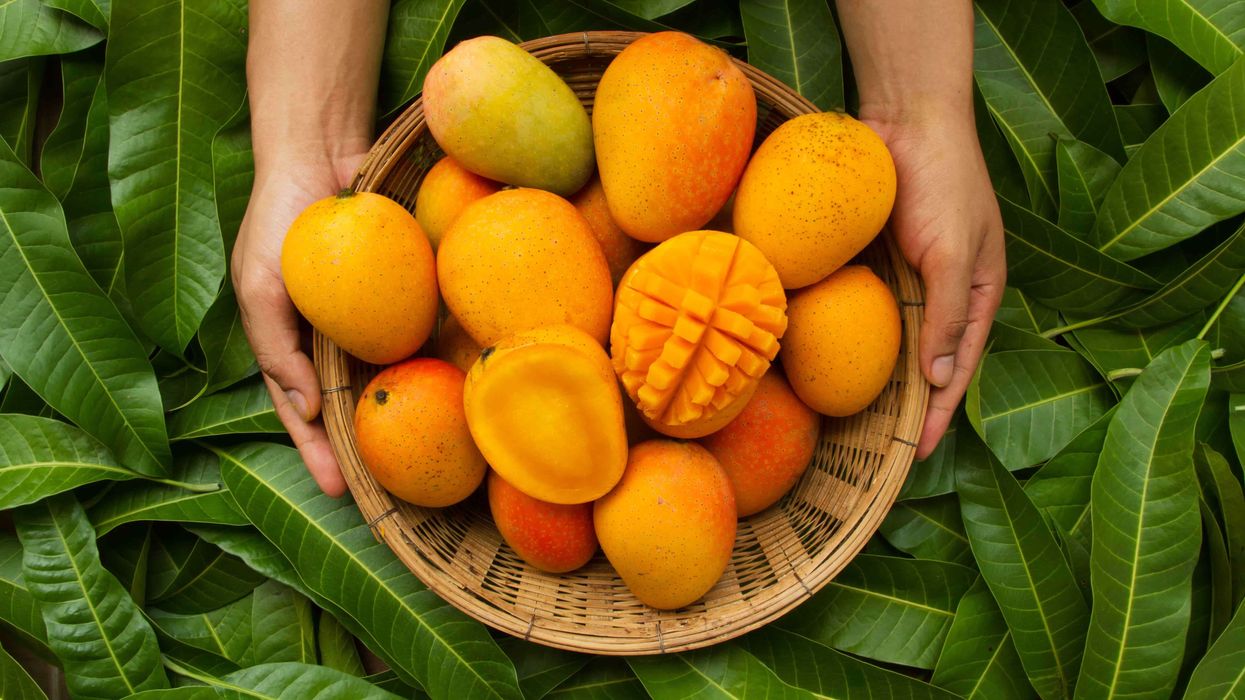

 How Long Does One Hit of Weed Stay in Your System
How Long Does One Hit of Weed Stay in Your System How Long Does One Hit of Weed Stay in Your System
How Long Does One Hit of Weed Stay in Your System How Long Does One Hit of Weed Stay in Your System
How Long Does One Hit of Weed Stay in Your System